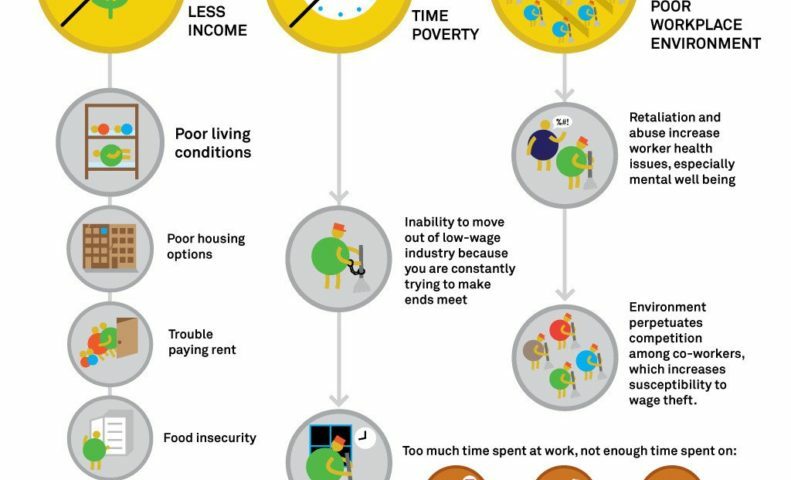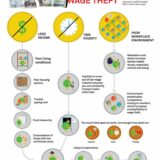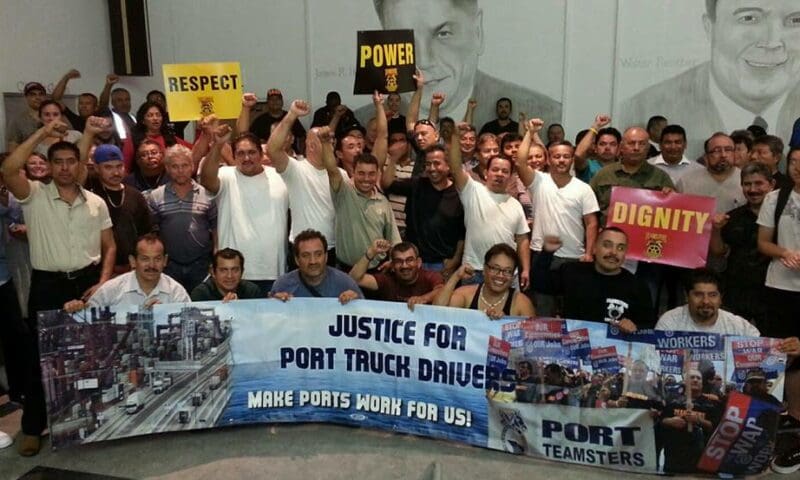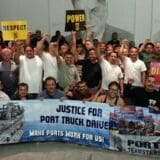LATEST NEWS


California voters passed a groundbreaking ballot measure this month that reduces penalties and sentences for nonviolent, “nonserious” crimes. Now, the private industry is responding to these changes in public attitudes and declining prison populations by opening up new lines of business.
A new report released by American Friends Service Committee (AFSC), Grassroots Leadership and the Southern Center for Human Rights, highlights the expansion of the private prison industry into other profitable and growing areas in the criminal justice system: prison and jail subcontracted medical care; forensic mental hospitals and civil commitment centers, as well as “community corrections” programs such as probation and halfway houses.
The report authors have named this new expanded private corrections industry the “treatment industrial complex” via the report.
As other states follow California’s lead and pass laws reducing mandatory minimum sentences, the report urges policy makers, advocates and others to ensure that private corporations can’t profit from any part of the criminal justice system.


Why are the port truck drivers on strike? It is well known that the U.S. economy relies in part on jobs generated or networked around the imports of manufactured commodities. The Ports of Los Angeles and Long Beach form a nexus of the global supply chain, where multinational corporations focus on every opportunity to keep labor costs low and profits high. One of the unrecognized links in the global supply chain is the port truck driver.
Port truck drivers play a pivotal role in the distribution of goods that makes them a critical piece of the profit puzzle. Professional drivers work long hours hauling nearly $4 billion worth of cargo every day from American seaports for companies like Walmart, Home Depot, Target, Costco and Polo/Ralph Lauren. Yet they often receive paychecks below the minimum wage, and on occasion, end up owing money to the firms that hire them.
Due to the privatization policies of the Nixon-Reagan era,
» Read more about: Why They Strike: Port Truck Drivers on the Move »


Los Angeles may be a capital for entertainment, tourism and culture, but for many local workers L.A. is synonymous with working off the clock, unpaid overtime and other labor-law violations. L.A. workers lose an estimated $26.2 million every week to bosses who fail to pay employees what they earn. However, we can learn something from other parts of the state that have taken serious measures to curb wage theft. From raising penalties on employers who steal, to shielding workers from retaliation, there are numerous strategies that can be used to put more earnings into workers’ pockets.
When it comes to enforcing labor laws, “the main obstacle is lack of resources,” Ruth Milkman, a sociology professor at the City University of New York and co-author of a 2010 UCLA wage-theft study, tells Capital & Main. “The scale of the problem is so much bigger than the capacity of these agencies to deal with it,” she continues.
» Read more about: Wage Theft Confidential: Finding Solutions »


The big white tent at Los Angeles Trade Technical College was festooned with balloons, draped in orange and white pennants and full of music. Swelling gospel-flavored sounds, Stevie Wonder’s “Signed, Sealed, Delivered” and the ubiquitous party song “No te Metes con Mi Cucu” signaled a break in the program after a parade of speakers.
The floor was covered with AstroTurf.
Last Saturday’s “Parent Power Convention” was the first-ever national gathering held by Parent Revolution, an organization founded here in 2009. With its feel-good inclusive vibe, the November 15 assembly attracted hundreds of parents, mostly African-American and Latino, from neighborhoods with failing and struggling schools.
Invitations offered free local transportation and childcare. There were many out-of-state visitors. Just as a national political party convention would be organized, delegates sat at tables with tall vertical signs that announced where they were from—Texas, Louisiana, Oklahoma, Mississippi – or identified the “parent unions”
» Read more about: Jumbotrons & Thundersticks: Parent Revolution Throws a Convention »


Capital & Main: Do you see risk in Democrats running away from a populist progressive agenda?
Mayor Bill de Blasio: Absolutely. I think the biggest development we saw [in the midterm election] was Democrats not standing up for the ideals of the Democratic Party, not talking to the economic realities of our people, not being willing to offer real progressive solutions. I think there’s another model of Democrats who actually addressed these issues, who were willing to take on big corporations, who were willing to challenge the status quo, who were willing to ask those who are wealthy to pay their fair share, who were willing to talk about how we create living wage jobs and better benefits….
People are looking for answers to what is now a fundamental structural economic crisis. The middle class has been collapsing, people’s earning power has been declining rapidly…. I love that the conventional wisdom [about the recent election] is about a conservative tidal wave.


In March, seven class action lawsuits filed in California, Michigan and New York suggested that for the country’s 30 million-strong low-wage workforce, getting one’s paycheck ripped off by some of the largest and wealthiest employers in America is too often business as usual.
Contending that the McDonald’s restaurant chain had been “systematically stealing” from its workers, the suits detailed company-wide practices of managers regularly ordering employees to work off the clock, shaving hours from their time cards and not paying overtime. Three of the California suits also claimed that McDonald’s and its franchise owners illegally altered pay records and denied employees meal periods and rest breaks. Other plaintiffs alleged McDonald’s used a sophisticated computer program that monitored real-time sales volume: When sales dropped below a certain level during any given hour, attorneys said, some managers would routinely order workers from the incoming shift to not punch in for an hour or two until there were more customers.
» Read more about: Wage Theft Confidential: The Worst Scofflaw Industries »


When I saw the subject line, “sad, sad news,” this past Monday from fellow mystery writer Reed Farrel Coleman, I figured it was to alert us in the mystery community of the passing of one of our elderly members. It damn near knocked me to the floor when I opened the email to read of the sudden passing of Jeff Fisher, the illustrator Reed first introduced me to several years ago — Jeff who played basketball and was my age.
Jeff had been doing the illustrations for “The Dixon Family Chronicles” webserial here on Capital & Main until his untimely death. He was a tall, gregarious guy and when we met that only time he was out here on the West Coast, we immediately hit it off.
Jeff struck me as a man who loved life and observed it to inform the drawings and illustrations he’d do – capturing those quirks of human expression and body language.


“Let me say again, we are not there yet. I’m not here to sell you a 50-inch HD flatscreen around the corner for a hundred bucks.” The youthful organizer grinned warmly, her eyes shining behind a pair of stylish eyeglasses. “Since its inception, this company, this giant octopus you all work for, has successfully fought off any effort to organize. Not just shop floor wide, but sector by sector. Make no mistake, we’re talking about a long, protracted struggle.”
Jess Dixon appreciated the woman’s honesty. She figured she wasn’t the only one who’d read on the Internet about the recent loss the International Association of Machinists and Aerospace Workers had trying to organize some of the company’s tech and maintenance workers at a facility back east.
“Even in Germany,” the organizer continued, “which is a heavily unionized workforce, you have workers lining up behind the anti-union bandwagon for fear of their jobs going elsewhere.
» Read more about: The Dixon Family Chronicles: “Which Side Are You On?” »


Capital & Main recently sat down with actor Ed O’Neill, best known for his role as Al Bundy in the Fox TV Network sitcom, Married With Children, and currently starring in ABC’s award-winning comedy, Modern Family, which will be honored in December at the Los Angeles Alliance for a New Economy’s 2014 City of Justice Awards Dinner.[divider]
What are your thoughts on the direction of the country after this last election?
I voted — I had to vote absentee because I was working. But these midterm elections are always puzzling to me because usually not many people come out for the vote. But obviously the country goes back and forth about so many things. I personally think Obama’s doing a pretty good job. Then again, I don’t follow it every day. For me,
» Read more about: Ed O’Neill: An Interview With a Modern Family Man and Union Guy »


California has roughly a dozen labor codes governing wage-theft on the books, with more proposed each year in the state legislature. Are these laws proving effective? Fausto Hernandez is one worker who doesn’t think they are. The 55-year-old native of Oaxaca, Mexico, has labored in the carwash business for a decade.
“For several years I worked at Slauson Carwash in South L.A. — 10 to 11 hours a day,” he told Capital & Main. “The employer would only pay me for three hours, never for all the hours I worked.”
According to Hernandez, he sought relief by contacting the CLEAN Carwash Campaign, a community coalition led by the United Steelworkers union. The campaign helped him file a claim with the Division of Labor Standards Enforcement (DLSE), an office of the state’s Labor Commissioner.
Workers who take such action face employer retaliation. Hernandez’s employer fired him, he said.


When I was 13 I was, like many kids growing up in L.A., offered a bit part in a movie. But this wasn’t any movie; this was Desire Under the Elms, starring Sophia Loren, Burl Ives and Anthony Perkins. Written as play by Eugene O’Neill, its story was so risqué that my mother wouldn’t let me see the film for years. (Young and beautiful Sophia Loren is married to old man Burl Ives but has a child by his slightly creepy son, Tony Perkins, while they’re all living together on an isolated farm.)
What excited me was getting out of school for two weeks, earning $28 a day and doing something my older sister never got to do. Beyond that, it was boring just sitting around on the set, being tutored in a cramped trailer, as required by state law, costumed in a gingham dress and bonnet with fake pigtails pinned to my head.
» Read more about: Two Women: What I Learned from Sophia Loren »


On Thursday, Americans earning low wages from businesses that contract with the federal government walked off the job to urge President Obama to do “more than the minimum” by signing executive orders that ensure workers receive living wages, adequate benefits and a voice on the job.
The organizers of the campaign, Good Jobs Nation, released a report earlier this week explaining why this change is necessary. As one of the nation’s largest employers, the federal government funds nearly two million poverty-wage jobs that pay less than $12 per hour. Unfortunately, many of these workers never receive any benefits such as paid sick leave and are forced to rely on public assistance, which costs more to taxpayers. We already know these same low-wage conditions wreak havoc on state and local economies. Governments may think they are getting a great deal when they outsource services, but when federal contractors fail to pay living wages to Americans providing essential functions,
» Read more about: Low-Wage Contract Workers: Obama Must Do More »
Activist Video Archive, that indispensable repository of Los Angeles’ progressive history, has recently released excerpts from an in-depth interview it conducted with Angela Sanbrano, a key figure in the Latino-rights movement. Sanbrano, who got her first reluctant taste of activism through the United Farm Workers union grape boycott, went on to co-found Inquilinos Unidos, was National Director of the Committee in Solidarity with the People of El Salvador (CISPES) and served as executive director of the Central American Resource Center (CARECEN-LA).
Sanbrano would play a critical role in organizing 2006’s massive immigrant rights march in Los Angeles that protested the criminalization of undocumented immigrants. Today she serves as the executive director of the Mexican Network of Migrant Leaders and Organizations.
» Read more about: Angela Sanbrano: “A Good Organizer Is a Pain in the Butt” »


For the fourth time within a year, truck drivers at the ports of Los Angeles and Long Beach have gone on strike. The drivers allege that two hauling companies, Total Transportation Services Inc. and Pacific 9 Transportation, have been retaliating against workers challenging their company-defined status as independent contractors, or who have expressed pro-union sympathies. At the heart of the drivers’ complaint is the charge that the two companies have broken the letter and spirit of a cooling-off agreement brokered by Los Angeles Mayor Eric Garcetti last July.
That agreement, which called on trucking companies to take back strikers without retaliating against them, had ended a weeklong walkout by the drivers over the issues of job classifications and working conditions.
At a waterfront press conference held today in Wilmington, Teamster union activist Alex Paz told listeners, “We are fed up with the injustices committed by companies that haven’t gotten the message yet” about the need to honor the cooling-off agreement.
» Read more about: Port Truck Drivers Strike Over Company Retaliations »


Wage theft is a serious yet seldom-reported crime that victimizes millions of Americans – particularly low-income and immigrant workers. Today, as part of an ongoing examination of workplace issues, Capital & Main debuts a new series focusing on wage theft, beginning with a primer on the problem by Bobbi Murray, followed by Joe Rihn’s profile of a port truck driver who works in an industry where wage theft is a daily fact of life.[divider]
The expression “wage theft” is a deceptively gentle term. Perhaps “paycheck mugging” more accurately describes the violence done to the earnings of millions of Americans each year.
If you are a target of wage theft no one pistol-whips you to acquire your valuables–but you definitely get robbed. Every week Los Angeles workers get held up for $26.2 million through unpaid overtime, being pressured to work through unpaid breaks or off the clock;
» Read more about: Wage Theft Confidential: How Your Earnings Are Stolen »


For Victor Vitela life revolves around work. A reserved man with dark hair and a powerful frame, Victor makes his living driving an 18-wheeler loaded with cargo back and forth from the ports of Long Beach and Los Angeles to the Inland Empire. His tone is matter of fact when he talks about his job with QTS Inc., a Gardena-based hauling firm. Victor often works late, until three or four in the morning, leaving just enough time to catch a few hours of sleep before the day begins again at 7 a.m. In his line of work, 20-hour days are the norm. That doesn’t leave enough time to return to his family in Ventura County, so he spends Monday through Friday living out of his truck.
Victor may spend a huge amount of time working for QTS, but you wouldn’t know it from his paycheck, which is eaten up by the kind of expenses and deductions many employers would be expected to pay – the insurance on his truck,
» Read more about: Wage Theft Confidential: A Truck Driver’s Story »


“Hello again,” a familiar female said to Little Joe, who stood ready for flight or fight on the sidewalk. The woman who spoke leaned out of the Escalade’s open rear door. The pearl black vehicle had stopped near him on the street.
He frowned, recognition blossoming. She’d been the one with Teaflake at the burrito joint. He came closer so as to get a better look inside the SUV. “Hello yourself.” There was only her and a bald-headed driver. Well at least it wasn’t Teaflake, he reflected—though it could be one of his enforcers. He remained wary.
“Can I give you a lift?”
“Is this a rubout?” he said, only half-joking.
She laughed heartily. “You’ve been watching too many of those Jimmy Cagney movies.”
The woman was charming and his curiosity was getting the better of his apprehension. What the hell, he concluded. Dressed in slacks and a ribbed top,
» Read more about: The Dixon Family Chronicles: “Esoterica” »


To say that Ed Wytkind likes to talk about America’s epic failure to invest in transportation is akin to saying that Pauline Kael enjoyed critiquing films or that Christopher Hitchens was fond of writing political commentary. Because Wytkind, who heads the AFL-CIO’s Transportation Trades Department and will be honored next month at the L.A. Alliance for a New Economy’s City of Justice Awards, lives and breathes transportation, and is determined to bring the issue front and center in the national conversation.
Wytkind, one of the country’s leading advocates for long-term investment in such things as mass transit and air travel modernization, offers a powerful case that the future of America’s economy is inextricably linked with our decision to either fund or starve our transit systems. And he can be a fierce critic of Congressional inaction on such priorities as full of funding Amtrak and repair of the nation’s neglected highways and bridges.
» Read more about: Trains, Planes and Politics – A Talk With Transportation Advocate Ed Wytkind »


“Shame on Arclight!”
“What do we want? Living wages! When do we want them? Now!”
Last Saturday evening the movie-and-sushi crowd that regularly assembles in the Sunset Boulevard ArcLight Cinema’s courtyard witnessed a spirited protest organized by the International Alliance of Theatrical Stage Employees Union (IATSE) Local 33, on behalf of the projectionists employed by Tinseltown’s priciest movie venue. It was the latest in a series of union actions against ArcLight aimed at drawing public attention to the theater projectionists’ meager wages — under $13 an hour and without health care or pension benefits — nearly half of IATSE’s pay and benefits compensation.
The timing couldn’t have been more annoyingly inopportune for ArcLight. The evening marked the grand opening of the Lionsgate picture Interstellar and, as it turns out, Lionsgate is now busy outsourcing, to overseas, jobs previously held by union musicians.


The Long Beach City Council is set to begin talks on Monday about a Project Labor Agreement that would apply to all city construction projects with a price tag of $125,000 or more. Project Labor Agreements, or PLAs, are “pre-hire” arrangements between unions, government agencies and private contractors who work together on construction projects. PLAs set wages, decide hiring practices and other matters between management and labor, often with the goal of creating community benefits through good jobs. According to a 2001 study on PLAs, prepared for the California State Senate, Project Labor Agreements have existed in California since construction began on the Shasta Dam in 1938, and have been used in both public and private sector projects.
“Project labor agreements are arguably the most important change in labor-management relations in the construction industry in recent years,” the report said.
Typically PLAs ensure that large construction projects pay fair wages,
» Read more about: Long Beach Considers Citywide Project Labor Agreements »